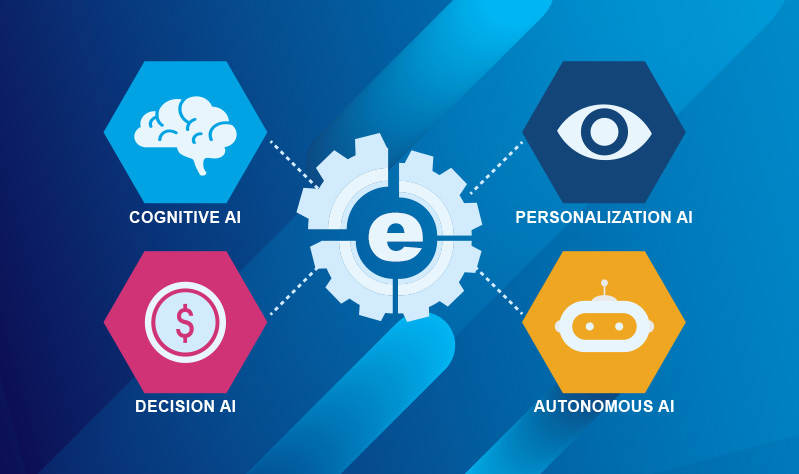Shifting Your eCommerce into High Gear with AI
With the dramatic and accelerated shift toward online, self-serve engagements, digital commerce is expected to overtake direct sales as the most-used channel for B2B selling. In fact, Gartner predicts that by 2025, 80% of B2B sales interactions between suppliers and buyers will occur in digital channels. In this increasingly crowded digital market environment, it’s critical to deliver the eCommerce experience your buyers expect. The question today is not about if, when, or even how to go digital, rather it’s about how to be outstanding and differentiated in this vast digital economy. And the secret sauce is none other than artificial intelligence (AI).
AI Categories That Are Crucial to eCommerce Success
So what exactly is artificial intelligence for business and how can it help differentiate your eCommerce? Here’s a crash course to help you understand a little more about what AI in eCommerce is all about. Despite thousands of applications of AI, most of them can be classified into 4 areas that are of paramount importance today. Some are more developed in eCommerce, while others have yet to realize their full potential. But they are all crucial to the success of your eCommerce.
1. Personalization AI (or Internet AI): ensuring your eCommerce is relevant to your users
The data used to train this type of AI has traditionally been derived from user behaviors on the Internet. The primary use case supports recommender systems and personalization engines. Internet AI is already widely used in eCommerce to provide a personalized recommendations of products and services and includes popular recommender systems from online platforms like Amazon, Spotify, and Netflix.
Due to the lack of person-to-person interaction on eCommerce platforms, personalization is crucial to provide relevance and individualized context to improve the user experience.
2. Cognitive AI (or Perceptual AI): creating a more dynamic and engaging user experience
The dominant use case of this class of AI is human-computer interaction. Virtual assistants (e.g. Cortana, Google Assistant, Siri, etc.) and chatbots are some of the most common examples of this class of artificial intelligence today. Because these tools often require machines to mimic the higher cognitive function of humans (e.g. vision, language, speech understanding, etc.), this category is also known as cognitive AI.
The proliferation of conversational agents has made Perceptual AI extremely popular in eCommerce. Since most eCommerce sites are relatively static and lack the engagement of physical shopping experiences, perceptual AI can make your eCommerce shopping experience much more interactive and engaging. As a result, many websites are implementing chatbots to help visitors navigate more efficiently and guide them to the information they are looking for. Perceptual AI can also be coupled with Internet AI to recommend products via conversational agents. An engaging and guided user experience through perceptual AI is more important than ever due to the post-pandemic influx of new users who might not be familiar with your eCommerce interface.
3. Decision AI or (Business AI): ensuring your eCommerce delivers business results
Typically used by business users instead of end consumers, the main use case of this class of AI is to automate decision-making within a company. PROS is an example of this type of AI. For your eCommerce, these decisions may be: “How do we set the price for a certain product? How long should we run a particular promotion? How much discount should we offer to our most loyal customers?”
Although every important business decision should be supported by some data, most business operations are far from this ideal. Where data-driven decisions are feasible, Business AI solutions will access all the relevant corporate data, perform the necessary analyses, and produce an optimal decision with the option to automate its subsequent actions. This automation can improve productivity, reduce costs, and free up time for teams to focus on value-added tasks such as customer relations or monitoring complex situations. Moreover, by optimizing the decision outcome and standardizing the decision processes, Business AI can help you deliver results more consistently. Business AI is critical to your eCommerce success especially now, as the pandemic has significantly disrupted demand and diminished margin in many industries.
4. Autonomous AI: delivering the “last mile” of your eCommerce
This is the kind of AI that powers the self-driving car and other autonomous systems (e.g. robotics and autonomous drones, IoT, etc.). Autonomous AI offers a huge opportunity for the eCommerce industry. Today, consumers can explore, research, configure, and purchase products or services online, but not all of them are downloadable with a click of a mouse. Many products and services still need to be delivered or performed in person by humans. This is known as the “last mile” delivery problem. Autonomous AI can bridge the gap between the physical world and your eCommerce in the digital world.
If you live in the San Francisco Bay Area, you can already see Autonomous AI helping eCommerce automate this “last mile” delivery of physical goods. Food and package delivery robots (e.g. Starship, Kiwibot, etc.) are appearing on select campuses and cities. JD.com, one of China’s leading eCommerce, is experimenting with drone delivery in remote areas. Since robots can be easily sterilized and made contagion free, these contactless delivery mechanisms will be in great demand in a more hygiene-conscious post-pandemic world.
Being Outstanding in eCommerce through AI
So how can your eCommerce stand out from the crowd? Amazon, for example, is leveraging all 4 categories of AI effectively to maintain its leadership position. This is perhaps one of the best examples of how innovative companies are using artificial intelligence in business. It has developed applications in each of the 4 classes of AI and adapted them to Amazon’s needs.
Amazon is one of the early pioneers of Internet AI. It has developed the famous recommender system: “Customers who bought this item also bought…” Amazon uses Perceptual AI in its speakers and mobile app with Alexa. The eCommerce giant is constantly adjusting prices to match the dynamic market demand with its own dynamic pricing algorithm, a form of Business AI. Finally, the company also uses Autonomous AI to power the robots in its warehouses to transport products to the right place at the right time to be inventoried, processed, packaged, labeled, and shipped. Amazon is also experimenting with drone delivery powered by Autonomous AI.
How are you going to use AI to stand out virtually in the digital world of eCommerce?
Adopting AI Will Make Your Business More Resilient Than Ever
For business, adopting AI means digital transformation, past digitizing your product catalog and putting it online. Since eCommerce is 24/7 and borderless, once you are online, you’ll be competing with every other online business for your customers’ limited attention. The competition will be fierce, so it’s important to learn from the best in order to stand out from the crowd. And the best eCommerce platforms now are using all 4 classes of AI to help them stay at the top. It’s foreseeable that these AI applications will become an integral part of every eCommerce in the near future. Don’t get left behind! Adopting AI in your eCommerce will help you differentiate and will make your business more robust and resilient.
Ready to take the next step in strengthening your eCommerce? Read more about the benefits of AI for business and how these benefits can improve the customer experience to help you drive conversions and customer loyalty with personalized offers.


